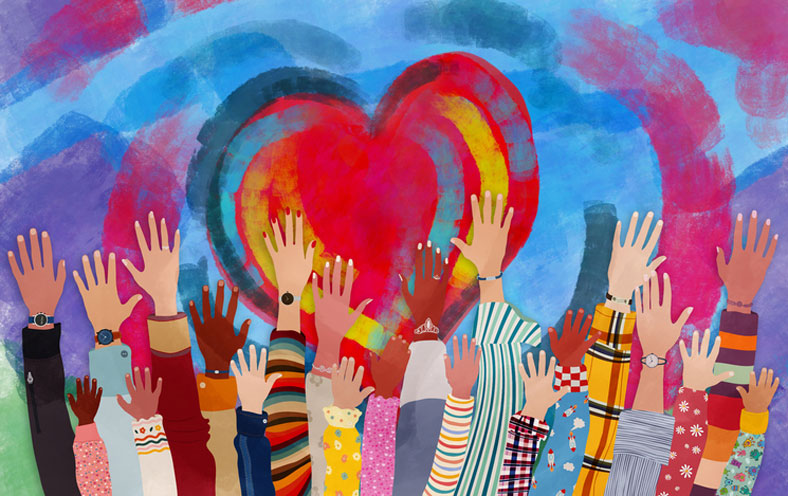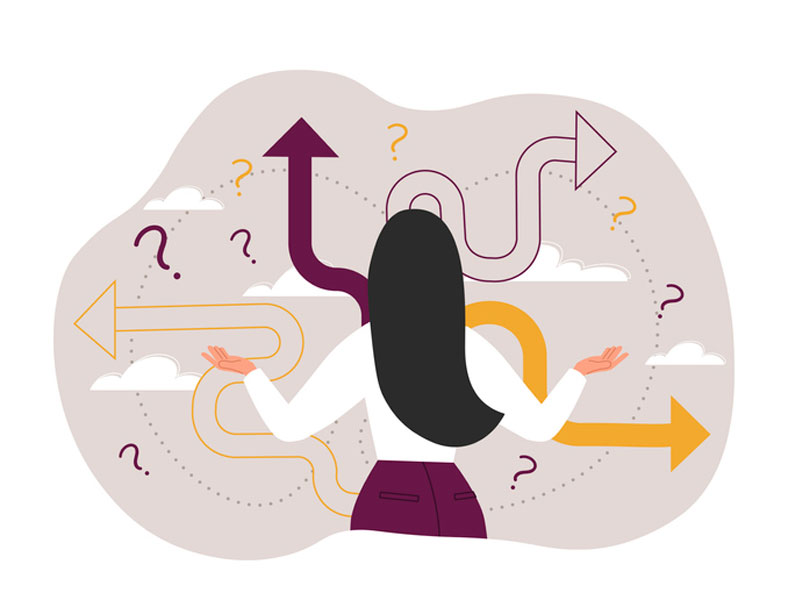Written by Sam Medley

8 million Californians depend on the state’s Department of Social Services to get by. Some are the homeless who need help in their struggles with mental illness, addiction, and hunger. Others are children who need someone to protect them against a world that has largely failed them. Still more are elderly and exploited, immigrated and ignored, and ostracized and oppressed. No matter what hardships their daily lives bring, social workers are there to help.
But being a social worker is about more than a passion for social justice. It’s about connecting people with the right resources at the right time. It’s about preventing crises before they happen and intervening when they do. To learn how to do these things effectively, many California students enroll in a bachelor of social work (BSW) program at one of the state’s many colleges or universities. If you’re called to take that path, here’s what you need to know about applying to, paying for, and studying at different BSW programs in California.

What Can I Do With a BSW In California?
BSWs (also known as bachelors of arts in social work or BASWs) are widely regarded to be entry-level social work degrees. However, entry-level social workers are vital to the field. In many cases, they work on the frontlines providing services directly to vulnerable people.

With a BSW in California, you can become a:
- Case Manager. Case managers work with individuals and families to assess their needs, develop care plans, and connect them to appropriate resources and services.
- Social Services Specialist. Social services specialists work for government agencies, nonprofit organizations, or community centers, providing a range of support services to clients, such as housing assistance, food programs, and financial support.
- Child Welfare Worker. Child welfare workers work with children and families involved in the child protection system, ensuring the safety and well-being of children and facilitating family reunification or alternative placements.
- School Social Worker. While school social workers focus on addressing the academic, social, and emotional challenges that impact students' well-being, they must also work with families and educators on creating healthy learning environments.
- Community Outreach Coordinator. Issues like unemployment, crime, and poverty can affect entire communities. Outreach coordinators provide the education and resources necessary to overcome them.
- Youth Worker. Similar to school social workers, youth workers support and mentor young people. However, they can work in multiple settings like after-school programs, community centers, and juvenile justice programs.
- Substance Abuse Social Worker. BSW graduates may work with people battling addiction, providing education, counseling, and support to individuals and groups.
- Mental Health Support Worker. Mental health support workers assist individuals with mental health challenges by providing coping strategies, resources, and referrals to mental health professionals.
- Gerontology Social Worker. This type of social worker works with older adults and their families, assessing needs and coordinating services to ensure the well-being and quality of life for seniors.
- Domestic Violence Advocate. Domestic abuse survivors often need help with housing, counseling, safety planning, and legal matters. Their advocates help them with these challenges and connect them with other professionals.
- Correctional Case Manager. Correctional case managers work with individuals involved in the criminal justice system, providing support, resources, and assistance in reentry planning. They can work in jails, probation offices, and with other legal agencies.
- Healthcare Social Worker. BSW graduates can work in healthcare settings, assisting patients and families in navigating medical systems, accessing resources, and coping with health-related challenges.
In California, you can also hold higher-level administrative positions with a BSW, but many employers prefer applicants with more experience or advanced degrees like a Master of Social Work (MSW).
What You Can’t Do With a BSW in California: An Overview of State Licensing Laws
Many states require social workers of all kinds to have a license. However, California only requires one type of social worker to be licensed: the clinical social worker.
Clinical social workers, also known as licensed clinical social workers (LCSWs), have specialized training that enables them to diagnose and provide advanced therapeutic treatment for mental health disorders. Non-clinical and unlicensed social workers are not allowed to carry out these duties in California.
The Board of Behavioral Sciences (BBS — the agency responsible for overseeing many of the state’s clinical psychology, therapy, and counseling professionals) says LCSWs must have an MSW. So If you’d like to provide clinical services, earning a BSW is only the first step in a rigorous licensing process.
First Thing’s First: The Importance of Accreditation in Your Hunt for BSW Programs in California
As you consider your career options, it’s important to identify BSW programs in California that can help you reach your goals. That raises an important question, though: how do students know which schools are able to do that? The answer lies in the accreditation provided by the Council on Social Work Education (CSWE).
The CSWE is a national accrediting agency that sets the standards for social work education in the United States. Its primary mission is to ensure that social work programs meet rigorous criteria and produce graduates who are well-prepared to enter the field as competent and ethical professionals.
State agencies across the nation (including the BBS in California) require social work licensing applicants to have completed courses through a CSWE-accredited program. Similarly, many employers prefer candidates with degrees from CSWE-accredited schools.
So whether you plan on looking for jobs right after earning your BSW or want to pursue an MSW, choosing a CSWE-accredited BSW program can help you keep your options open.
Common Admission Requirements for BSW Programs in California
BSW programs in California frequently have the same admissions requirements as other types of bachelor’s programs. While policies may vary between schools, here are a few of the most common things you’ll be asked about or have to submit during the application process:
- High School Diploma or Equivalent. A high school diploma or GED is typically required for admission to any bachelor's degree program.
- GPA. While GPA requirements vary, many schools only accept students who earned a high school GPA of at least 2.5. However, some schools mandate that students with GPAs lower than 3.0 also submit standardized test scores.
- Standardized Test Scores. Some schools ask students for ACT or SAT test scores, but many use test-optional application processes. This means that you can submit test scores if you feel they reflect well on your academic abilities. Otherwise, faculty sometimes use test scores to determine what level classes would be best for you.
- Prerequisite Course. Before starting your social work education, you may have to complete some of your college’s general education requirements. This might include psychology, sociology, foreign languages, statistics, and other courses related to social work. Advanced Placement (AP) classes you took in high school may count towards these requirements.
- Letters of Recommendation. In general, bachelor’s programs ask incoming students to provide at least two letters of recommendation. These typically come from teachers, work supervisors, coaches, and others who can attest to your academic abilities and relevant personal traits.
- Personal Statement or Essay. Many BSW programs in California require applicants to submit a personal statement or essay explaining their interest in social work, their relevant experiences, and their career goals.
Some BSW programs in California may also ask about your volunteer and work experience. But even if a school doesn’t require it, relevant experience may help you secure a spot in the program of your choosing. Some schools also require an interview with admissions staff.
If you’re a transfer, international, or non-traditional student, be sure to investigate additional policies.
Picking the Right BSW Program: Formats and Credit Hour Requirements
To get the most out of your social work education, look for schools that offer programs that fit into your lifestyle. Fortunately, BSW programs are more flexible than ever before so more students can answer their calls to service.
Different types of BSW programs in California include:
Traditional BSW Programs
These programs offer a comprehensive curriculum in social work principles and practices. Students in traditional programs typically attend full-time classes on campus and often earn their degrees in about four years.
Part-Time BSW Programs
Part-time BSW programs are designed for students who need a more flexible schedule due to work or other responsibilities. Students in part-time programs often earn their BSWs in five to six years.
Online and Hybrid BSW Programs
Online programs often provide flexibility in terms of scheduling and allow students to complete coursework remotely while still fulfilling fieldwork requirements. In hybrid programs, students take some classes online and some on-campus. Online students can take classes full- or part-time.
Dual-Degree Programs
Some universities offer dual-degree programs that combine a BSW with another related degree, such as a Bachelor of Arts in Psychology or a Bachelor of Science in Public Health. These programs can be great for students with specific career paths in mind, but may take five to six years to complete.
Integrated BSW/MSW Programs
Integrated programs allow students to transition seamlessly from their BSW studies into a Master of Social Work (MSW) program at the same school. These programs often reduce the total time and coursework required to obtain both degrees separately.
No matter the format, most BSW programs in California require students to take about 120 credit hours of classes. Each class is worth between one and four credit hours. The majority are worth three.

For full-time students, this breaks down to about 15 credit hours or about five classes per semester. Part-time students take fewer classes per semester over a longer period of time.
However, this 120-credit-hour requirement includes general education classes, electives, and other courses colleges typically require bachelor’s students to take. BSW classes generally account for 45 to 60 credit hours or more. If you decide on a dual degree program, pick two majors, or add a minor to your studies, you may be required to complete more. Credit hour requirements vary between schools.
How Much Does a BSW Cost In California?
The cost of a BSW program in California can vary widely depending on whether the school is public or private, whether you’re an in-state or out-of-state resident, and whether you take courses online or on-campus. Room and board, books, and other costs may also affect your total costs.
BSW Program Costs at Public Institutions in California
According to the National Center for Education and Statistics (NCES), the average cost of tuition and required fees for an in-state student attending a public four-year institution in California was $8,192 for the 2020-2021 academic year. In-state students who also paid for room and board paid an average of $24,015 that same year. Out-of-state students paid an average total of $34,398 for room, board, tuition, and other mandatory fees.
BSW Program Costs at Private Institutions in California
Private institutions typically cost more than public ones. In the 2020-2021 academic year, the NCES reports that students at private four-year institutions in California paid an average of $38,477 for tuition and required fees. Those who also paid for room and board paid an average of $53,680 that year.
Keep in mind that these are state-wide averages. Your costs may differ and are subject to change.
Making Your BSW More Affordable
The cost of a college education keeps many students from following their true passions. However, when it comes to helping students financially, California is one of the top states in the nation.
In 2022 alone, California students received more than $2 trillion in aid through the state-sponsored Cal Grant Program. Students who qualify for Cal Grant aid can receive help for everything from tuition to living expenses. Awards earned through this program don’t have to be repaid.
But that’s only one way for California students to make their education more affordable. You may also want to explore:
- Scholarship and grant opportunities
- Work study programs
- Online and hybrid options
- Need-based financial aid programs
Core Classes for BSW Programs
Becoming a social worker means learning how to help people through any and all types of circumstances. At the bachelor’s level, you’ll learn about the theories behind this vital field and practices you can use in multiple types of social service agencies. Specific courses may vary, but here are a few you might take.
Introduction to Social Work
This course provides an overview of the history, values, and ethics of social work as a profession. It introduces students to the various roles and functions of social workers in different settings.
Social Welfare Policy and Services
California is home to many social welfare agencies, each with their own policies and purposes. In policy classes, students learn about the evolution of these policies, their historical contexts, and their impact on communities in California and the world as a whole. You’ll also likely learn about wider topics like poverty, inequality, and social justice.
Human Behavior in the Social Environment
This class examines the psychological, biological, and sociocultural factors that influence human behavior. Students learn how to apply this knowledge to understanding clients and assessing their needs.
Generalist Social Work Practice
After learning about the basics of the field, students take classes on the measures used to help clients. This might include assessment, interviewing techniques, case management strategies, and crisis intervention. Some schools split these topics into different classes. But either way, this knowledge can prepare you to serve individuals, groups, families, and entire communities.

Social Work Research Methods
Identifying widespread issues, measuring their impacts, and evaluating intervention techniques is vital to improving social services. When taking research classes, students learn the basics of research design, data collection, and analysis in the context of social work.
Cultural Competence and Diversity
On all levels, California is one of the most diverse states in the country. As a social worker, you’ll need a solid background in cultural sensitivity, diversity, and inclusivity to serve your clients to the best of your abilities.
Ethics and Professional Responsibility
Social workers help vulnerable people in extremely complex situations. Ethics courses prepare students to accomplish this task while also respecting their clients’ rights, building trust in the community, and maintaining healthy professional boundaries.
Child Welfare
Child welfare is only one specialty within social work, but learning how to help children and families is a pillar of the field. In fact, California is home to almost 50,000 child, family, and school social workers. In these types of courses, you’ll learn about family dynamics, evidence-based interventions, child development, and how to navigate the state’s child welfare system.

Electives, Specialties, and Other Things To Look For
Most BSW programs in California focus on preparing students for general practice. Typically, students explore specialties at the Master’s level. However, many bachelor’s programs introduce students to specialties through electives and classes that dig deeper into more specific areas of the field. This can include classes on mental health, addiction, LGBTQ+ advocacy, and racial justice. Some schools even offer specialty tracks for these areas and more.
You may also want to look for schools with culturally-based student organizations, community outreach programs, and other extracurriculars that can shape your experience and prepare you for a long, impactful career.
The Fieldwork Experience
In most types of bachelor’s programs, internships are rare. But according to the CSWE, all accredited BSW programs must require students to complete 400 hours of fieldwork or more. So before you graduate, you’ll have the kind of hands-on experience most undergrads can only dream of.
Choosing a Fieldwork Site
BSW programs in California often have strong relationships with social work agencies of all kinds. Your school’s fieldwork coordinators can help you find a suitable location. If you’re an online student, they can help you find an agency close to you.
You can complete your fieldwork experience in places like:
- Social service agencies
- Child welfare agencies
- Hospitals and other medical settings
- Schools
- Community centers
- Mental health organizations
- Substance abuse treatment centers.
- Criminal justice agencies like jails, probation offices, and juvenile detention centers.
- Organizations focused on cultural, racial, and LGBTQ+ advocacy.
Wherever you work, the main goal is to pick a location that will expose you to experiences that prepare you for your career and help you decide on a path.
What You Might Do and Supervision Policies
During your fieldwork experience, you’ll get to observe and shadow professional social workers. On top of that, you’ll also get to apply the things you learn in class to real-world scenarios. For this reason, the fieldwork experience can be one of the most exciting and formative parts of your education.
As a student in the field, you might:
- Conduct client assessments.
- Participate in case management activities like referring clients to different services and coordinating between different service providers.
- Help facilitate client interventions and support group meetings.
- Promote social service resources through community outreach and public education initiatives.
- Help social workers take notes on clients and record important information.
- Attend agency meetings.
As you complete these activities, you’ll be supervised by a professional social worker who will work closely with your school and faculty advisors. This person can provide guidance, track your progress, and help you reflect on your experiences. When you return to class, your instructors will likely encourage you and your peers to compare experiences and give each other the support professionals in this emotionally-taxing field need.
What Will Your Next Step Be?

Armed with a powerful blend of knowledge and experience, you have another important question to consider: what path will you take? Will you jump right into your career? Will you pursue a Master’s in Social Work and become an expert in one of the field’s many specialties? Maybe you’ll do both. Either way, California needs competent, passionate social workers of all kinds in every community.
To help you take your first step, here are a few CSWE-accredited BSW programs in California that offer a wide variety of formats and an equally diverse selection of classes.
California State University, Los Angeles
School of Social Work
Accreditation: CSWE and WSCUC
Formats: Full-time and part-time. On-campus.

Bachelor of Arts in Social Work (BASW)
Also offers:
- Master of Social Work (MSW).
- Undergraduate certificates in areas like gerontology, community nutrition, youth agency administration, and cultural diversity in human services.
Fresno Pacific University
Accreditation: CSWE and WSCUC
Formats: Full-time with daytime classes and a two-year evening class option.

Bachelor of Social Work (BSW)
Also offers:
- Master of Social Work (MSW) and Master’s degrees in Applied Behavioral Analysis, School Counseling, and Special Education.
- Degrees and minors in fields like health sciences, law, psychology, sociology, and social welfare.
San Francisco State University
College of Health and Social Sciences
Accreditation: CSWE and WSCUC
Formats: Full-time.

Bachelor of Arts Social Work (BASW)
Also offers:
- Master of Social Work (MSW).
- BASW-Master of Arts in Gerontology integrated program (students earn BASW and MA in five years).
- Stipend programs for MSW students working in child welfare, public schools, integrated behavioral health, and childhood mental health.
Touro University Worldwide
College of Health and Social Sciences
Accreditation: CSWE and WSCUC
Formats: Full-time and part-time. Completely online.

Bachelor of Arts Social Work (BASW)
Also offers:
- Master’s programs in fields like Human Services, Healthcare Administration, Addiction Counseling, and Marriage and Family Therapy
- Policies that allow transfer students to transfer up to 45 general education credits and 45 BSW credits.
University of Massachusetts Global
School of Arts and Sciences
Accreditation: CSWE and WSCUC
Formats: Full-time and part-time. Completely online.

Bachelor of Arts Social Work (BASW)
Also offers:
- Master of Social Work (MSW) and programs at the Master’s and bachelor’s level for counseling, child psychology, criminal justice, and clinical counseling.
- Electives in topics like domestic violence, military social work, drug and alcohol treatment, and social work with Latino populations



